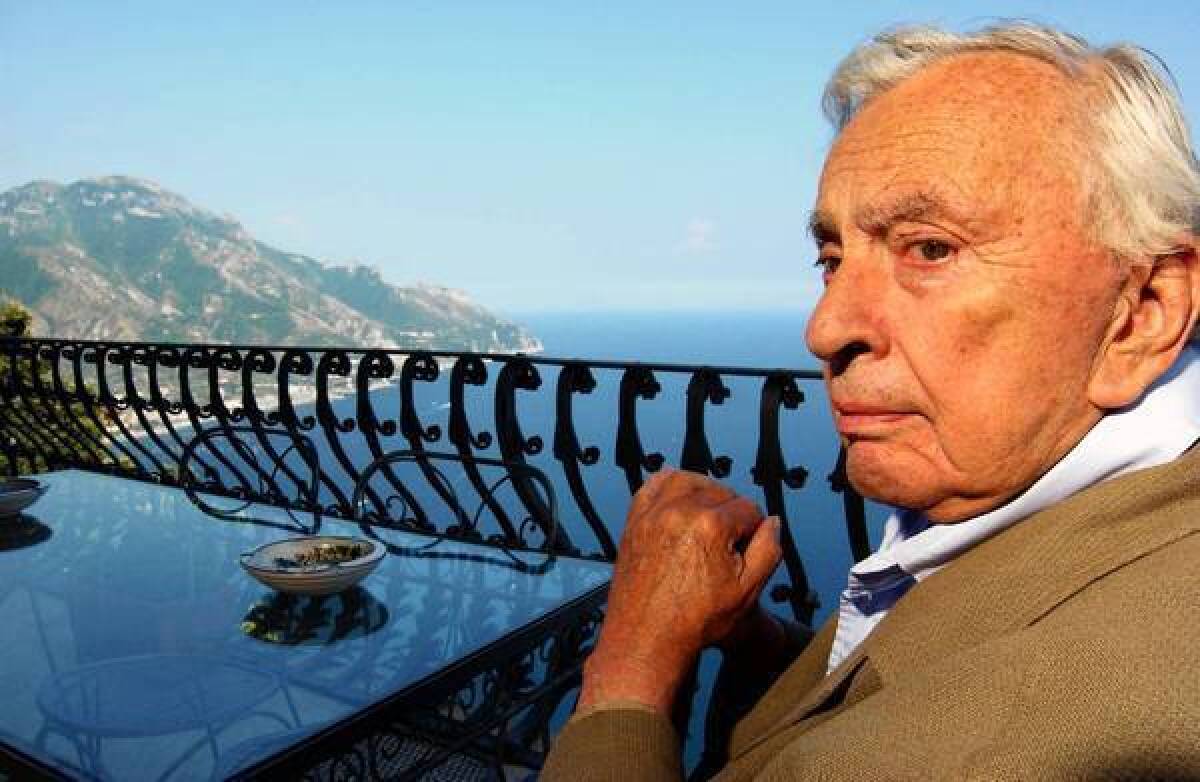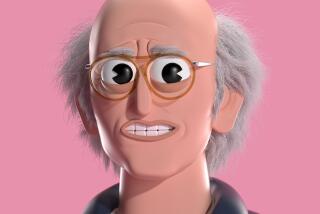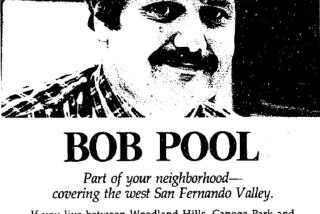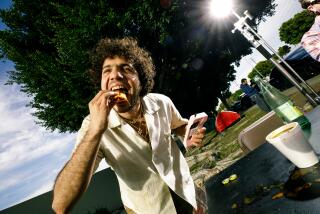Raising a last glass to Gore Vidal

- Share via
I arrived at the Gore Vidal tribute at Musso & Frank and was directed to Alan Selka, a Brit resplendent in paisley print dinner jacket, tie and waistcoat — yes, a waistcoat.
“Sort of,” said Selka, when I asked if he had come to the Hollywood landmark to celebrate the American novelist, playwright, political essayist and screenwriter, who died July 31 at his Hollywood Hills home at age 86.
Selka, longtime butler to a Hollywood executive whom I agreed not to name, explained that he’d been introduced to Vidal by Ali MacGraw in the back of a limousine. He’d see him after that, at the Beverly Hills Hotel and Musso & Frank, “boozing to the end — and I admire that.” Selka was eating there because that’s what he does but was happy to join the Vidal homage.
“He was a Wildean figure of our time,” Selka said.
The wake Thursday was impromptu, organized by the Los Angeles Visionaries Assn., which also sponsors a literary salon at Musso. There was no program, no literary figures, no one from the brilliant circles that Vidal — grandson of a U.S. senator and related by marriage to Jackie Kennedy — traveled in.
Instead, one woman said she came because of Ernestine, Lily Tomlin’s phone operator character on the old “Rowan & Martin’s Laugh-In” TV show, who sparred with an unseen “Mr. Veedle” over the line. A West Hollywood tour guide had met Vidal once, when she arrived late to a book signing to find him alone. He dished to her about Elizabeth Taylor, who had died that very day.
Councilman Tom LaBonge, the Zelig of Council District 4, blew through, posing with a woman who parked herself on a stranger’s lap. By the end of the evening, a jagged line of martinis ran down the mahogany bar; Vidal took his with Grey Goose vodka.
It was a spectacle Vidal most likely would have loved. For all his high-WASP breeding, his mandarin hauteur, Gore Vidal was a populist. He ran for office several times and never stopped trying to convince the American people to reverse what he saw as a disastrous course of empire-building, engineered by politicians from his own patrician class.
Vidal was a public intellectual at a time that such figures, not Snooki or the Kardashians, were celebrities. He spent so much time on Johnny Carson’s couch that he was offered a guest host chair, the New York Times noted in its obituary
At the homage, music publisher Robert Balter dated his admiration for Vidal to the author’s televised debate with his conservative nemesis, William F. Buckley Jr., during the 1968 Democratic convention. Vidal called Buckley a “crypto-Nazi.” Buckley flung back “queer.”
It’s on YouTube; watch it. Or better yet, look at the other online clips that show the erudition of Vidal and Buckley, who had been hired by ABC to cover the convention. Then try to picture anything like it when the Republicans roll into Tampa on Aug. 27, or the Democrats come to Charlotte on Sept. 3.
Vidal regularly delivered his own State of the Union address, and he spoke at an antiwar rally on Hollywood Boulevard to a crowd that his people would probably have described as the rabble.
I attended the Vidal memorial with a touch of regret. I had been trying for months to interview the author and see if he would turn his acerbic brain on the Romney-Obama presidential campaign. He had wit. He had good sense. And when it came to aphorisms, he was inimitable. Vidal, who lived platonically with his partner, Howard Austen, for decades, on sex: “It’s easy to sustain a relationship when sex plays no part & impossible, I have observed, when it does.” On looks: “A narcissist is someone better looking than you are.” On Truman Capote, with whom he famously feuded: Death was “a good career move.”
Now I discovered that I might have found Vidal in his wheelchair at Musso’s Table No. 2, waiting out what he called “the Cedars-Sinai years,” and holding forth to the entire ragtag Hollywood crowd. His populism wasn’t a front. This was a man who graciously entertained any admirer who approached him, humored celebrity hunters, and shared the insights that made him famous with anyone who had the good luck to fall into conversation with him. I could have been one of them.
Ian Wilkie, a New York-based employee of Christie’s auction house, spotted Vidal in Musso & Frank during a West Coast trip and whispered to his 14-year-old son, “That’s Gore Vidal.”
“At least I thought I whispered,” Wilkie said. “Then I heard him in his big voice say, ‘Yes it is.’ ”
They chatted briefly. Wilkie said what he really liked was Vidal’s vicious put-downs. “Half the things he said were just to mess with the other guy,” Wilkie said. (But he used a less polite term for “mess with.”)
Jimmy Pappas, a fashion designer sometimes called the mayor of Musso’s, said he drove Vidal home from the bar one night after the author quarreled with his entourage.
“I told him I didn’t agree with his politics,” Pappas said. “But I said, ‘I know your famous quote: I never miss an opportunity to appear on television or have sex,’ and we kind of laughed. He was real appreciative I gave him a ride.”
Perhaps the most poignant tribute came from Sergio Gonzalez, the red-jacketed Musso waiter who served Vidal for many years, bringing him his favorite Crab Louie, creamed spinach and eggplant.
Gonzalez sat down for an interview at an empty table. Vidal told Gonzalez he was a model for the “Aztec terrorist” in the author’s 1983 novel “Duluth,” a wicked parody of Reagan-era America. “He would say, ‘We’ve got to take over Los Angeles pretty soon,’ ” Gonzalez said. “You bring your army and take Echo Park, and I’m going to bring my navy and take Silver Lake.”
“He was such a nice guy to me,” said Gonzalez, striking his heart with his fist several times.
And yes. Vidal was a good tipper.
“Very,” Gonzalez said. “He used to give me $100.”
More to Read
Sign up for Essential California
The most important California stories and recommendations in your inbox every morning.
You may occasionally receive promotional content from the Los Angeles Times.













